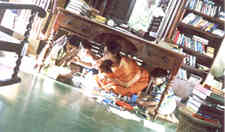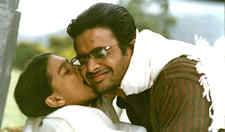Amrutha Review
Performances
Script
Music/Soundtrack
Visuals
NA
NA
NA
NA
Suggestions
Can watch again
NA
Good for kids
NA
Good for dates
NA
Wait for OTT
NA

Amrutha is one of the best ever movies made on Indian soil. It's the same genius that Mani Ratnam showed in Anjali that's back on display, and this time he says it with even more Jell-O. One of the most tender tales ever narrated, it has you all dewy-eyed consistently, and puts Mani Ratnam firmly in the league of the Old Masters of celluloid.
The story starts with that quintessential Mani Ratnam trademark - a pre-credits prologue. In a small village in war-ravaged interior Sri Lanka called Maangalam, a frisky young Shyamala (Nandita Das) is just off the pandal and frolicking around with her newly-wed Dilipa (Chakravarthy) in the sylvan rural locales, when a posse of soldiers surrounds a lake they're cavorting at. Cowering in the undergrowth, Dilipa tells a tearful Shyamala that he has to leave, for freedom's sake. He runs away, never to appear again.
The story starts with that quintessential Mani Ratnam trademark - a pre-credits prologue. In a small village in war-ravaged interior Sri Lanka called Maangalam, a frisky young Shyamala (Nandita Das) is just off the pandal and frolicking around with her newly-wed Dilipa (Chakravarthy) in the sylvan rural locales, when a posse of soldiers surrounds a lake they're cavorting at. Cowering in the undergrowth, Dilipa tells a tearful Shyamala that he has to leave, for freedom's sake. He runs away, never to appear again.

Shyamala already has one baking in the oven, and when the savagery of war catches up with Maangalam, lands up at a refugee camp at Rameswaram in India and delivers. And abandons the baby at a Red Cross camp there to get back to Maangalam.
It's Madras 9 years later, and 9-year-old Amrutha's biggest problem in life is her Telugu teacher, who so grimpishly insists that she be studious in class. Mom Indira (Simran) is still okay despite all her "nagging", and Dad Srinivas (Madhavan), a famed writer, is swell. And two kid brothers are good jellyroll to pummel.
An excellent Sundari song later, it's Amrutha's 9th birthday, and idealistic Srinivas has decided that she should now know the truth, from her parents before someone else tells her - that she was adopted.

Nothing has changed, insist the doting parents in a series of brilliant scenes, but the kid is conflicted and wants to know exactly why she was abandoned and who her real mother is. And when she makes an unscheduled departure from home for Rameswaram to trace her mom out on her own, Dad decides that they might as well join the mission themselves.
And so the trio gets to Sri Lanka, and to Maangalam there, but fails to find Shyamala there. Maangalam is destroyed in an air strike just as they get there, and moving around in the debris, Srinivas and his escort Wickramasinghe (Prakash Raj) are captured by some LTTE cadres, whose leader, in a contrived scene, recognizes Srinivas as the great writer, and also happens to know Shyamala's whereabouts - she's his own sister, and part of the camp. He promises to get her to a park the next day to meet her daughter.
But back at the camp, Shyamala refuses to go.
The film is sheer brilliance at the rate of 24 frames per second, and in every discovered aspect of movie-making. A novel and touching story, exceptionally creative conceptualition of situations, outstanding performances, some great dialogues ("We didn't adopt you," Srinivas tells his teary-eyed daughter, "you adopted us."), excellent music (it's Rahman) and the usual Mani Ratnam technical sheen make this an absolute must-watch.
Amrutha is a celebration of subtlety, with most feelings conveyed through expressions rather than through words. And when you're trying to do that, you need brilliant performances. Which is what is a huge asset for the film.

Simran and Madhavan are outstanding - the former especially so. But while they are pros, it is entirely to Mani Ratnam's credit - again - that he could make the kids perform the way they did. Keertana, daughter of one-time heroine Seeta, is excellent as Amrutha. And all the scenes involving the kids are a class apart.
A superb portrayal is of Shyamala, by Nandita Das. The last scene of the film had even some earring/leather-jacket/bracelet donning youngsters in the theater looking embarrassed when the lights came on, thanks to eyes gone all red. There was practically no one that this writer saw around him without some new improved glistening.
There will perhaps be critics carping about small licenses taken in the depiction of the situation in the island, things like an oh-so-filmi rain that starts right at a dramatic moment, that scene where the Tigers recognize Madhavan, the improbable escape in a car from the middle of a virtual battlefield etc., but they are just minor flaws in a tremendous effort (though they still cost the last half in the rating...). The only rather unrealistic thing is Amrutha's hostility towards her mother after she is told.
Above all, Amrutha is a manifestation of directorial genius. Don't miss Padmasri No. 1!
AMRUTHA SNAPSHOT
AMRUTHA USER REVIEWS
1 - 14 OF 14 COMMENTS
174 USERS
Performances
Script
Music/Soundtrack
Visuals
NA
NA
NA
NA
Can watch again - NA
Good for kids - NA
Good for dates - NA
Wait for OTT - NA
Mr.Maniratnam has done it again.
movie is fantastic. there are many things to learn from this movie, infact every movie of his has a meaning and a message. he is too good.Maniratnam has to be little considerate , he should allow us to meet him.
movie is fantastic. there are many things to learn from this movie, infact every movie of his has a meaning and a message. he is too good.Maniratnam has to be little considerate , he should allow us to meet him.
RATING
10
If you truly a mani ratnam fan then take my advice... Don`t watch amritha,its just an ordinary movie BUT the original version of tamil ' kannathil muthamithal ( a kiss on your cheek) is the master piece.Its a tamil movie in every sense,the Sri lanka touch of the movie is the most important aspect,which is lost in the dubbed telugu version.Its not even half of what the tamil original is.
WATCH THE ORIGINAL-IT WORTH IT.
WATCH THE ORIGINAL-IT WORTH IT.
RATING
6
its a asome movie the best of its kind..the beatiful blend of reality with a platform of morols exspecially the cote which says"what is the reason that people fight...n the only way to stop it is to throw the weapons in sea"..
RATING
10
Extrodinary and can't be understood by ordinary people...hence movie is Fl_p.
gopivel@hotmail.com
gopivel@hotmail.com
RATING
10
Extradinary movie for an Ordinary Chirus,Nags,Venkeys movie goer. Learn a thing or two from ManiRatnam.
RATING
10
Here I am, reviewing the movie without seeing it! Its certainly an irony that defies explanation ! But thats Mani Ratnam..you see his movies and wonder what his next movie is like. I thought he was losing his touch, and hope this movie resurrects his magical craft.
RATING
10
Amrutha- superbly told and stunningly crafted,maniratnam reassures that good cinema is still alive and kicking.Thanks to an engaging directorial style,a cleverly crafted script and mani's talent for casting makes it a superior quality cinema.
Every frame in the film has a lyrical quality about it, which is heightened by aesthetically designed sets and colour schemes.One must be surprised by the attention to detail paid in this film...like 'sakhi'.
This time mani had a simple story which is very honestly told.It was splendidly visualised.
Every frame in the film has a lyrical quality about it, which is heightened by aesthetically designed sets and colour schemes.One must be surprised by the attention to detail paid in this film...like 'sakhi'.
This time mani had a simple story which is very honestly told.It was splendidly visualised.
RATING
10
The movie is different from todays trend of movies with stories of teenage love. It shows how the children feel when they are adopted by foster parents. What questions arrive in their minds.
Maniratnam has done justice to the subject he selected. the performances of the cast and the crew is outstanding. I liked the picturisation of the song "Ye devi varamo" in both halves of the movie
It is amazing how maniratnam shoots the songs in slowmotion with great precesion. thanks to maniratnam for giving a marvalous movie. The performance of keerthana as amrutha will remain in
my mind for a very longtime. I feel that A R Rahman is lucky to work with a genius film director like maniratnam for a long time right from his first movie as music director. the comments made in the above review are almost same what i have thought.
Maniratnam has done justice to the subject he selected. the performances of the cast and the crew is outstanding. I liked the picturisation of the song "Ye devi varamo" in both halves of the movie
It is amazing how maniratnam shoots the songs in slowmotion with great precesion. thanks to maniratnam for giving a marvalous movie. The performance of keerthana as amrutha will remain in
my mind for a very longtime. I feel that A R Rahman is lucky to work with a genius film director like maniratnam for a long time right from his first movie as music director. the comments made in the above review are almost same what i have thought.
RATING
8
Genius effort of Maniratnam, ofcourse, i think nobody will miss maniratnam movie however it may be! A Classical movie worth watching !!!
RATING
10
First half of the film is entertaining. Second half of the film is pretty slow and boring at
times. The film is rich and well taken. But when it comes to entertainment values, it disappoints. The
entire second has a single mission of Amrutha searching for her real mother and that's where the
directors loses grip in sustaining interest among the viewers. The director should have shown how
Nanditha Das transforms from a innocent housewife into LTTE activist and what happened to Chakri
when he left Nanditha after first night. The ending of the film is abrupt just like the climax of 'Dil Se'. It
may not find a liking for the regular moviegoers. But it's a must-watch for all the movie lovers who are
interested in get into films line. We have to wait and see what the box office has in store for this
Mani Ratnam's film, which released after 2 years.
times. The film is rich and well taken. But when it comes to entertainment values, it disappoints. The
entire second has a single mission of Amrutha searching for her real mother and that's where the
directors loses grip in sustaining interest among the viewers. The director should have shown how
Nanditha Das transforms from a innocent housewife into LTTE activist and what happened to Chakri
when he left Nanditha after first night. The ending of the film is abrupt just like the climax of 'Dil Se'. It
may not find a liking for the regular moviegoers. But it's a must-watch for all the movie lovers who are
interested in get into films line. We have to wait and see what the box office has in store for this
Mani Ratnam's film, which released after 2 years.
RATING
6
not a great movie. maniratnam could have been better.
RATING
4
the movie is one hellu'va movie. and the review is fantastic.
RATING
8
LEAVE A COMMENT
fullhyd.com has 700,000+ monthly visits. Tell Hyderabad what you feel about Amrutha!
MORE MOVIES
Contemporary Reviews
SEARCH MOVIES
Dissatisfied with the results? Report a problem or error, or add a listing.
ADVERTISEMENT
SHOUTBOX!
{{ todo.summary }}... expand »
{{ todo.text }}
« collapse
First | Prev |
1 2 3
{{current_page-1}} {{current_page}} {{current_page+1}}
{{last_page-2}} {{last_page-1}} {{last_page}}
| Next | Last
{{todos[0].name}}
{{todos[0].text}}
ADVERTISEMENT
This page was tagged for
amrutha nilayam movie cast
Amrutha story based on movie in recent telugu
Actress amrutha telugu movie
amrutha genius school
sxehot